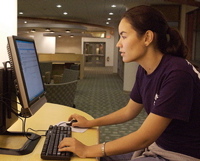Tulane University President Scott Cowen to visit BU, address displaced students
December 1 event open to all Tulane students, parents, and alumni

Tulane University President Scott Cowen will visit BU on December 1 to address displaced Tulane students, their parents, Tulane alumni and prospective students in the Boston area. Cowen is expected to discuss his university’s January reopening, plans for its long-term future, and its leadership role in rebuilding New Orleans following Hurricane Katrina.
The visit is hosted by BU President Robert Brown and sponsored by Sherry Leventhal, a Tulane Law School graduate, and her husband, BU Board of Trustees’ Chairman Alan M. Leventhal. Cowen’s address, which will be followed by a reception, is part of a series of informational sessions he is holding around the country for displaced students; it takes place from 5 to 7:30 p.m. at BU’s Track and Tennis Center at 100 Ashford St.
“Tulane is an outstanding institution with a great reputation,” says Brown. “We are fully supportive and enthusiastically cooperating in its effort to re-acquaint alumni, students, and their families with the city and the university post-Katrina.”
More than 300 Tulane students are enrolled at BU as visiting students, the most at any college or university in the Northeast. Several hundred Tulane students attending other institutions in the Boston area also have been invited to the BU event.
"Many of us look forward to hearing about where the university is headed," says Melissa Ann Taylor, a Tulane senior studying at BU this semester. "As anxious as we are to get back, we also realize we are not returning to the same school we left in August. I don’t think any of us are ready to say good things have come from such a catastrophic event . . . but we’re all anxious to see how we, as students, can step up and begin to rebuild both Tulane University and the city of New Orleans when we get back."
First steps
Tulane, which will reopen for the spring semester on January 17, expects that the vast majority of its students will return. To that end, school officials are considering bold steps to secure housing for students, faculty, and staff, such as purchasing off-campus real estate and even using cruise ships. And the university expects to retain its entire full-time faculty and to cover more than $100 million in property damage with insurance and federal assistance.
Still, the institution faces serious challenges: it is considering paring back programs and has launched an emergency fundraising drive to pay for its operating-budget losses.
Sherry Leventhal is confident that Tulane students and their families who attend Scott Cowen’s address will decide that returning to study in New Orleans is the right choice. “Students and their families have a lot of questions, regarding safety, environmental factors, and housing and this forum will allow them to get those questions answered,” she says. “Tulane is handling the situation fabulously, so far. In particular, Cowen has been good about communicating with the Tulane community and being very honest with them.”
The Leventhals, who donated generously to the Tulane emergency fundraising drive in addition to paying for the December 1 event, say they’re determined to help Tulane because as New Orleans’ largest employer, the university must recover in order for the city to be rebuilt.
And in fact, Tulane officials are using the institution’s geography as a selling point — the campus will feel like “a small college town in a Peace Corps environment” because of opportunities to participate in relief and rebuilding efforts, Cowen told the New Orleans Times-Picayune recently. (Cowen himself is integrally involved in rehabbing the city, as he was chosen recently by Mayor Ray Nagin to develop a plan to reform the Orleans Parish educational system.)
“New Orleans will be an experimental city for several years, and that provides students an incredible chance to get out of the classroom and learn by doing,” says Leventhal. A native of New Orleans, she practiced law in that area for 20 years before moving to Massachusetts eight years ago.
“Tulane first needs to get back in the saddle, and that means its students returning,” she adds. “It also means alumni stepping forward and contributing to its rebuilding.”